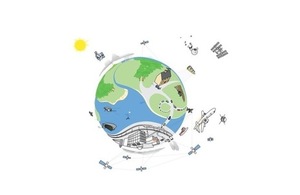SatelLife competition winners announced
Twelve young space entrepreneurs have won a share of £50K for innovative ideas on how to use satellite data to improve life on Earth.

Credit: Satellite Applications Catapult.
A variety of impressive competition entries saw ideas ranging from coastal change monitoring to helping anticipate and prevent heart attacks.
The winners will pitch their ideas to a panel of ‘dragons’ from the UK space sector, who can offer specialist prizes such as mentoring, work experience or even develop their ideas into reality. Congratulations to all of the winners, whose ideas are summarised below:
Overall winner: James Pearson (age 13) – Coastal Monitoring
Prize: £10,000.
Location: Lincolnshire.
James lives on the Wash – the recent flooding events have affected some family friends, and this has inspired him to look at what satellites could do for coastal change.
His idea is a mobile app which collects, analyses and visualises a range of location-based data, aimed at the coastal environment. This would allow users:
- to see changes in the coastal environment over time
- to geo-tagging wildlife to help track sightings, location and changes in habitat over time
- to track sea level changes over time
- to view trends in weather and climate data over time
It would use open source data, and would be ‘A simple one place location to get all the information you need to know on how coastal areas are changing, and to record and show trends.’
Elliot Vale (age 22) and Tia Mountain (age 20) - GeoRescue
Prize: £5,000.
Location: Stourport-On-Severn.
GeoRescue is an innovative app focused primarily at people who live in or travel to high-risk natural disaster areas. It will provide real-time information on predicted, at-risk and ongoing disasters and aims to guide you out of the affected area using advanced maps services. In addition, once activated the app will emit a signal using GPS indicating your location for search and rescue and emergency services.
Razzia Gafur (age 21) – IISpace
Prize: £5,000.
Location: Newcastle.
Imaging in Space (IISpace) this entry hopes to launch cheap cubesats to deliver a suite of information to make satellite data very cost effective and with a very quick turn-around of information, meeting customer needs directly. They are particularly interested in getting into the gaming market, and using satellite data to support virtual reality activities.
Sam Frampton (age 22) - Mapping of Tropospheric emissions at Higher Resolutions (MOTHR)
Prize: £5,000.
Location: Fareham.
MOTHR aims to track health-hazardous pollutants down to the scale of individual buildings. Sam proposes using satellite observations to track the emission of key health-hazardous emissions (Particulate Matter, NO2, Ozone and SO2) on a scale smaller than city sized, to aid and improve current tracking of pollution levels. This information could then be shared with both the general public and public health organisations to reduce the impact of poor air quality on health. This tool could be used both in the UK and overseas.
Chloe Hewitt (age 19) – Warehouse identification
Prize: £5,000.
Location: Solihull.
Warehouse identification proposes using satellite data to accurately identify and map disused industrial buildings. This could allow local authorities and others to better use brown field sites for development and also maps ‘at risk’ areas.
Lauren Paton (age 15) and Ella Sheffield (age 16) - How satellites could improve the UK prison system
Prize: £5,000.
Location: Devon.
Observation satellites could be used to track movement surrounding prisons, which would help identify and disrupt the supply of drugs; using navigation to better understand track movement of prisoners using tags. The goal would be to improve prison security and to reduce NHS costs by reducing drug taking in prisons.
Jacob Lelliott (age 15) and Paul Grimwade (age 15) – SATUS
Prize: £5,000.
Location: Oxfordshire.
The idea is an app which is ‘local’ to you i.e. it pulls together information which is local to you on tourism, health services, environment etc. and brings it into one place. It would note your change of location and offer you different services based on location. The app would be open source, allowing people to upload local information and support. This app would bring together lots of things that already exist into one place, to support individuals in their local community.
Jack Threlfall (15) – Mineral mining and identification
Prize: £5,000.
Location: Beaconsfield.
The idea is to use imaging and other techniques from satellites (such as spectroscopy) to identify minerals and then explore the opportunity to mine them. This data would be useful to mining companies, governments and environmental groups.
Isla Richards (age 16) – Medical Satellite Programme
Prize: £5,000.
Location: Aylesbury, Buckinghamshire.
Many people wear heart monitors, and activity trackers. These present an opportunity to catch someone who is in ‘peri-arrest’ (the stage before a cardiac arrest) and get them to help, or get help to them, by utilising the GPS tracker that is also in these wearables. It would only take a slight modification to allow this to happen – or the development of a new wearable.
Currently the survival rate for someone having a cardiac arrest not in hospital is 8.6%. This would be dramatically increased if the emergency services were able to reach an at-risk person before the attack happened, or knew the location of the patient the moment it did.
Updates to this page
-
The location and ages of winners have been updated.
-
First published.